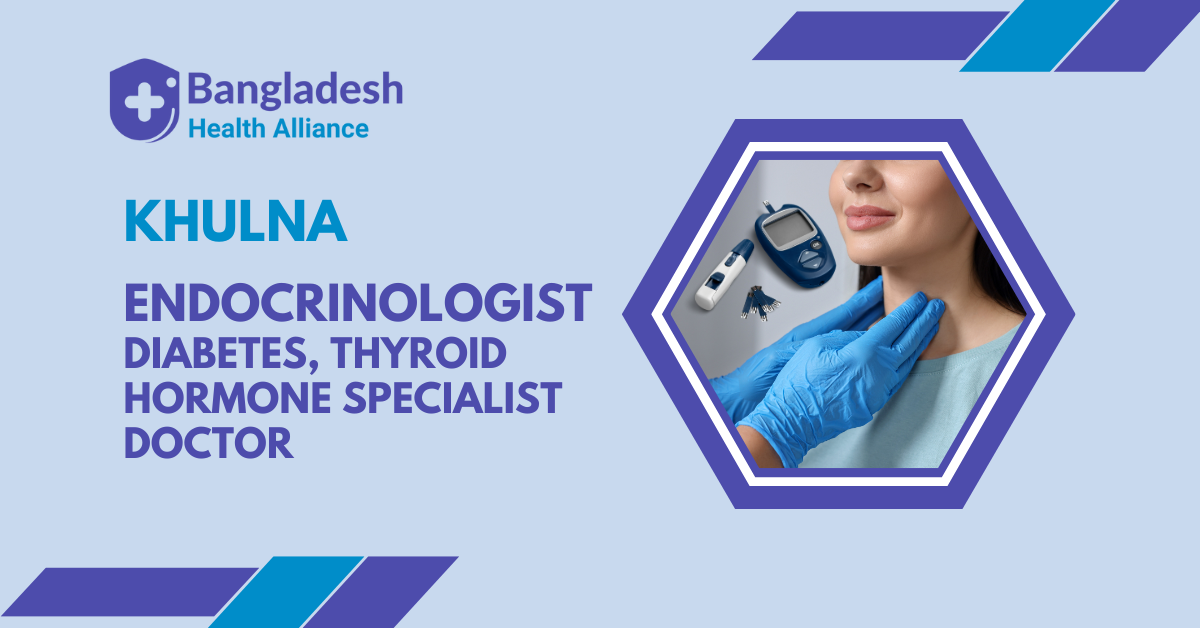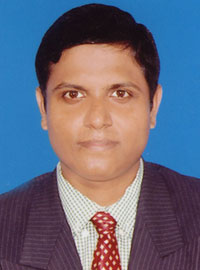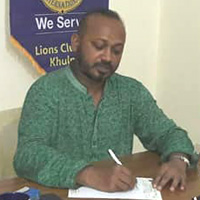In the bustling city of Khulna, individuals grappling with diabetes and hormonal imbalances can find solace in the expertise of top-tier Diabetes specialists, Thyroid specialists, and Endocrinologists. These medical professionals, equipped with years of experience and advanced training, are adept at providing comprehensive Diabetic Care, Hormone Treatment, Thyroid, and addressing Hormonal Imbalance conditions.
Top 5 Endocrinologist – Diabetes, Thyroid, and Hormone Doctor in Khulna
Dr. Debashish Kumar Ghosh – Thyroid Specialist in Khulna
Dr. Ghosh stands out as one of the most esteemed Endocrinologists in Khulna. His academic journey is adorned with a series of prestigious qualifications, starting with an MBBS. He further distinguished himself by achieving the BCS (Health) certification, showcasing his dedication to the medical field. Not stopping there, Dr. Ghosh pursued and successfully completed the FCPS in Medicine, a testament to his deep-rooted knowledge and expertise. His pursuit of excellence led him to the shores of the UK, where he earned the MRCP, a renowned medical degree recognized globally. Culminating his educational endeavors, he secured an MD in Endocrinology, solidifying his position as a specialist in the field. (থাইরয়েড বিশেষজ্ঞ ডাক্তার)
Currently, Dr. Ghosh is making significant contributions to medical education and patient care in his role as the Assistant Professor and head of the Department of Endocrinology at Khulna Medical College & Hospital. His leadership and expertise have been instrumental in shaping the department and ensuring the highest standards of patient care.
- MBBS, BCS (Health), FCPS (Medicine), MRCP (UK), MD (Endocrinology)
- Thyroid, Hormone Specialist Doctor
- Khulna Medical College & Hospital
Chamber & Appointment:1
- Chamber: Royal Diagnostic & Consultation Limited, Khulna
- Address: 4, KDA Avenue, Khulna
- Appointment: +8801716-591930
Chamber & Appointment:2
- Chamber: Labaid Diagnostic, Khulna
- Address: House # A5, Majid Sarani, Sonadanga, Khulna
- Visiting Hours: 5 pm to 8 pm (Closed: Friday)
- Contact Number: +8801766661020
With a blend of vast experience, profound knowledge, and a passion for endocrinology, Dr. Ghosh has established himself as a beacon of hope for patients with endocrine disorders in Khulna. His holistic approach to treatment, combined with his dedication to staying updated with the latest medical advancements, ensures that his patients receive the best possible care. Whether it’s guiding the next generation of doctors or providing top-notch treatment to his patients, Dr. Ghosh’s commitment to excellence remains unwavering.
Dr. Md. Asaduzzaman – Endocrinologist in Khulna
Dr. Md. Asaduzzaman is a distinguished Endocrinologist based in Khulna, renowned for his profound expertise and dedication to the field. His academic journey is a testament to his commitment to medical excellence. He began with an MBBS from Rajshahi Medical College (RMC), followed by a BCS in Health, showcasing his foundational medical knowledge and skills. Furthering his specialization, he pursued an MD in Endocrinology, delving deep into the intricacies of hormonal disorders. His pursuit of global medical standards led him to achieve the MACE from the USA, further elevating his credentials. (হরমোন বিশেষজ্ঞ ডাক্তার)
In addition to his academic accomplishments, Dr. Asaduzzaman is proudly affiliated with the Shaheed Shaikh Abu-Naser Specialized Hospital, where he plays a pivotal role in providing top-tier endocrine care to patients.
- MBBS (RMC), BCS (Health), MD (Endocrinology), MACE (USA)
- Diabetes, Thyroid & Hormone Specialist
- Shaheed Shaikh Abu-Naser Specialized Hospital, Khulna
Chamber & Appointment: 1
- Chamber: Popular Diagnostic Center, Khulna
- Address: 37 KDA Avenue, Khulna
- Visiting Hours: 3 pm to 5 pm (Closed: Friday)
- Appointment: +8801799047719
Chamber & Appointment: 2
- Chamber: Sandhani Clinic & Diagnostic Complex, Khulna
- Address: 58, Babu Khan Road, Opposite of Azam Khan Commerce College, Khulna
- Visiting Hours: 5 pm to 9 pm (Closed: Friday)
- Appointment: +8801799047719
Dr. Md. Asaduzzaman stands as a beacon of hope for patients grappling with endocrine disorders in Khulna. His vast experience encompasses the management of diabetes, thyroid disorders, and various hormonal imbalances. His patient-centric approach, combined with his in-depth knowledge, ensures that individuals receive comprehensive care tailored to their unique needs. Whether it’s guiding patients through their treatment journey or staying updated with the latest medical advancements, Dr. Asaduzzaman’s unwavering commitment to excellence shines through in every aspect of his practice.
Dr. S.M. Zakir Hossain – Diabetes & Diabetic Footcare Specialist
Dr. S.M. Zakir Hossain stands out as a leading figure in the realm of diabetes care in Khulna. His medical journey commenced with an MBBS from the esteemed Dhaka Medical, laying a robust foundation for his future endeavors. Not one to rest on his laurels, Dr. Hossain pursued a CCD in Diabetes from BIRDEM, one of the premier institutions for diabetes care in Bangladesh.
His quest for knowledge didn’t stop there. He further enriched his expertise by obtaining a CC-CD from the National Heart Foundation, emphasizing cardiovascular aspects related to diabetes. Recognizing the importance of specialized foot care for diabetic patients, Dr. Hossain underwent rigorous Diabetic Footcare Training at CMC Vellore in India, a renowned medical institution known for its advanced training programs.
Currently, Dr. Hossain is making significant strides as a Diabetologist at the City Heart Diagnostic and Consultation Center, specifically in the Department of Diabetes and Diabetic Footcare. Here, he employs a holistic approach, ensuring that patients receive comprehensive care, from regular blood sugar monitoring to specialized foot care treatments.
- MBBS (Dhaka), CCD (Diabetes, BIRDEM)
- CC-CD (National Heart Foundation), Diabetic Footcare Training (CMC Vellore, India)
- Diabetes & Diabetic Footcare Specialist
- Diabetologist, Diabetes and Diabetic Footcare
Chamber Information:
- Chamber Name: City Heart Diagnostic & Consultation Center
- Address: 43, KDA Avenue (Sathi Complex), Moylapota, Khulna
- Visiting Hours: Everyday 4 pm to 8 pm (Closed: Friday)
- Contact Number: +8801795339461
With a blend of vast experience, profound knowledge, and a passion for patient care, Dr. S.M. Zakir Hossain has carved a niche for himself in Khulna’s medical community. His meticulous approach to diagnosis, combined with personalized treatment plans, ensures optimal health outcomes for his patients. His dedication to the field and commitment to continuous learning make him a beacon of hope for those battling diabetes and its associated complications.
Dr. M. B. Zaman – ডায়াবেটিস বিশেষজ্ঞ ডাক্তার (Diabetologist)
Dr. M. B. Zaman is a distinguished Diabetes Specialist in Khulna. He has acquired his MBBS from Dhaka and further honed his expertise with an MPH in Public Health, D.M.U from Dhaka, and a C.C.D from Birdem. Currently, he holds the position of Senior Medical Officer at Khulna Diabetic Hospital, Boyra, Khulna. His dedication to the field and commitment to patient care have made him a trusted figure in the realm of diabetes treatment in the region.
- MBBS (Dhaka), MPH (Public Health), D.M.U (Dhaka), C.C.D (Birdem)
- Senior Medical Officer: Khulna Diabetic Hospital, Boyra, Khulna.
- ডায়াবেটিস বিশেষজ্ঞ ডাক্তার
Chamber Information:
- Chamber Name: Khulna Diabetic Hospital
- Address: RGJV+FCV, Boyra Main Rd, Khulna 9000
Dr. Zaman specializes in treating a range of diabetes-related conditions, including diabetic wounds, diabetes-related vein diseases, sugar growth and decrease, body squeezing, kidney diseases caused by diabetes, gestational diabetes, congenital/hereditary diabetes problems, and more. His comprehensive approach to patient care and his vast knowledge in the field make him a sought-after diabetes specialist in Khulna.
Dr. A. H. M. Shadequl Islam – Hormone Specialist (হরমোন বিশেষজ্ঞ ডাক্তার)
Dr. A. H. M. Shadequl Islam is a distinguished figure in the field of endocrinology in Khulna. He embarked on his medical journey with an MBBS, laying a solid foundation for his specialization. His dedication to the field led him to pursue the BCS in Health, further emphasizing his commitment to medical excellence. Dr. Islam’s passion for endocrinology culminated in an MD in Endocrinology and metabolism, equipping him with in-depth knowledge and expertise in diagnosing and treating a wide range of hormonal disorders.
In his current role as a Consultant at the Shaheed Shaikh Abu-Naser Specialized Hospital’s Department of Endocrinology, Dr. Islam employs a comprehensive approach to patient care. He ensures that each patient receives a tailored treatment plan, addressing their unique hormonal imbalances and associated conditions.
- MBBS, BCS (Health), MD (Endocrinology & Metabolism)
- Diabetes, Thyroid & Hormone Specialist
- Shaheed Shaikh Abu-Naser Specialized Hospital, Khulna
Chamber & Appointment
- Chamber: Islami Bank Hospital, Khulna
- Address: 42, Khan Jahan Ali Road, Shantidham Mor, Khulna
- Visiting Hours: 2.30 pm to 5 pm (Closed: Friday)
- Appointment: +8801711298607
Dr. A. H. M. Shadequl Islam’s reputation in Khulna’s medical community is a testament to his dedication, expertise, and patient-centric approach. His vast experience in treating endocrine disorders, combined with his continuous efforts to stay updated with the latest medical advancements, ensures that his patients receive the best possible care. Whether it’s guiding patients through their treatment journey, conducting research, or mentoring the next generation of endocrinologists, Dr. Islam’s unwavering commitment to the field shines brightly.
How to Select the Right Endocrinologist Near You In Khulna
- Credentials: Ensure the doctor has the necessary qualifications and is board-certified in endocrinology.
- Experience: Consider the number of years the doctor has been practicing and their expertise in treating specific conditions.
- Patient Reviews: Look for patient testimonials or reviews to gauge the doctor’s reputation.
- Hospital Affiliation: Check if the doctor is affiliated with a renowned hospital or medical center in Khulna.
- Location: Consider the proximity of the doctor’s clinic or hospital to your residence.
- Consultation Fees: Inquire about the doctor’s consultation fees and if there are any additional charges for tests or procedures.
- Insurance Coverage: Check if the doctor or clinic accepts your health insurance and understand what treatments or procedures are covered.
- Payment Plans: Some clinics may offer payment plans or discounts for patients. It’s worth asking about any available financial assistance or options.
Questions to Ask Your Diabetes Doctor
- What is the cause of my condition?
- Are there different treatment options available?
- What are the potential side effects of the prescribed medications?
- How often should I schedule follow-up visits?
- Are there any lifestyle changes I should make to manage my condition better?
- What symptoms should prompt me to seek immediate medical attention?
- Are there any recommended dietary changes?
- How can I monitor my condition at home?
- Are there any advanced treatments or procedures I should consider?
- Can you provide any resources or reading materials about my condition?
Preparing for Your Appointment With a Hormone Specialist Doctor
- Medical History: Compile a detailed medical history, including any medications you’re currently taking, past surgeries, and any other health conditions.
- Symptom Journal: Maintain a diary of your symptoms, noting their frequency, severity, and any triggers.
- List of Questions: Prepare a list of questions or concerns you want to discuss with the doctor to ensure you don’t forget anything during the consultation.
- Bring Previous Reports: If you’ve had tests or treatments related to your condition elsewhere, bring those reports to provide the doctor with a comprehensive view.
Post-Appointment Care
- Medication Adherence: Ensure you understand the dosage and timing of any prescribed medications and adhere to them strictly.
- Follow-up Visits: Schedule and attend any recommended follow-up visits to monitor your condition and treatment progress.
- Seek Support: Consider joining support groups or online forums where you can connect with others who have similar conditions. Sharing experiences can provide emotional support and practical tips.
All You Need to Know About Diabetes, Thyroid, and Hormonal Disorders
Understanding Diabetes:
Diabetes, often referred to as the ‘silent killer,’ is a persistent health condition that affects millions worldwide. It arises when there’s an imbalance in the body’s ability to process glucose, a type of sugar. When we eat, our digestive system breaks down food into glucose, which is then used by our cells for energy. The hormone insulin, secreted by the pancreas, acts as a gatekeeper, allowing glucose to enter the cells. However, in individuals with diabetes, this system is disrupted. The result is an excessive buildup of glucose in the bloodstream, which, if left unchecked, can lead to a host of health complications.
Types of Diabetes:
Type 1 Diabetes: Often diagnosed in childhood, this type is an autoimmune condition. The body’s immune system mistakenly attacks and destroys insulin-producing cells in the pancreas. As a result, little to no insulin is produced.
Type 2 Diabetes: This is the most common form of diabetes. Here, the body either resists the effects of insulin or doesn’t produce enough to maintain a normal glucose level.
Gestational Diabetes: This type occurs in some women during pregnancy. While it usually resolves after childbirth, it does increase the risk of developing type 2 diabetes later in life.
Understanding Thyroid Disorders
The thyroid, a butterfly-shaped gland located in the front of the neck, plays a pivotal role in regulating the body’s metabolism through the release of thyroid hormones. These hormones influence vital bodily functions, including heart rate, body temperature, and energy levels.
Types of Thyroid Disorders:
- Hypothyroidism: This condition arises when the thyroid gland produces an insufficient amount of thyroid hormones. Common symptoms include fatigue, weight gain, cold intolerance, and depression.
- Hyperthyroidism: Contrary to hypothyroidism, hyperthyroidism is characterized by an overproduction of thyroid hormones. Symptoms often include weight loss, heat intolerance, increased heart rate, and anxiety.
- Goiter: An enlargement of the thyroid gland, often visible as a swelling at the base of the neck. It can be due to iodine deficiency, inflammation, or nodular growths.
- Thyroid Nodules: Small lumps or growths that form on the thyroid gland. While most nodules are benign, a small percentage can be cancerous.
- Thyroiditis: Inflammation of the thyroid gland, which can lead to either hyperthyroidism or hypothyroidism.
- Thyroid Cancer: Though relatively rare, thyroid cancers are usually treatable and often present as nodules or swelling in the neck.
Diagnosis and Treatment:
Thyroid disorders can be diagnosed through blood tests that measure thyroid hormone levels and thyroid-stimulating hormone (TSH). Imaging tests, such as ultrasound or radioactive iodine uptake tests, can also be used.
Treatment varies based on the specific disorder. It may include:
- Hormone replacement therapy for hypothyroidism.
- Anti-thyroid medications, radioactive iodine, or surgery for hyperthyroidism.
- Surgery for large goiters, nodules, or cancer.
Prevention and Management:
Regular check-ups and blood tests can help in early detection and management of thyroid disorders. Consuming an iodine-rich diet can prevent some forms of goiter. It’s essential to follow the prescribed treatment plan and attend follow-up appointments to ensure optimal thyroid health.
Endocrinologists: The Hormone Maestros
Endocrinologists are the unsung heroes in the world of medicine, delving deep into the intricate world of hormones. These specialists have a deep understanding of the endocrine system, a network of glands that produce hormones. These hormones act as messengers, guiding various bodily functions.
The Role of the Endocrine System:
Beyond just regulating blood sugar, the endocrine system plays a crucial role in various bodily functions. From determining one’s mood and energy levels to regulating growth, metabolism, and even reproductive processes, this system is indispensable. It’s a harmonious interplay of various glands, each producing specific hormones to maintain the body’s equilibrium.
Common Hormonal Disorders:
Endocrinologists are adept at diagnosing and treating a myriad of conditions. These range from thyroid disorders like hyperthyroidism (overactive thyroid) and hypothyroidism (underactive thyroid) to adrenal gland disorders such as Addison’s disease and Cushing’s syndrome. They also address growth abnormalities like gigantism and reproductive issues like polycystic ovary syndrome (PCOS).
Complications of Uncontrolled Diabetes:
The repercussions of unmanaged diabetes are manifold. It can affect almost every organ, leading to heart and blood vessel diseases, nerve damage (neuropathy), kidney damage (nephropathy), and even blindness. Diabetic patients are also more susceptible to skin infections, and hearing problems, and in severe cases, might even face cognitive disorders like Alzheimer’s.
Prevention and Management:
The key to managing diabetes and hormonal imbalances lies in early detection and a proactive approach. Regular medical check-ups, maintaining a balanced diet, engaging in physical activity, and abstaining from tobacco can significantly reduce the risk. It’s also essential to stay informed and updated about one’s condition and the latest treatments available.
Empirical Insights: A Deep Dive into Diabetes and Endocrinology Research & Statistics
Understanding Diabetes: A Statistical Overview
- Global Prevalence: According to the World Health Organization (WHO), an estimated 422 million adults worldwide had diabetes in 2019, and the number is projected to rise in the coming decades [1].
- Diabetes in Bangladesh: As per the International Diabetes Federation (IDF), approximately 8.4 million adults in Bangladesh were living with diabetes in 2019, emphasizing the importance of specialized care in regions like Khulna [2].
The Growing Need for Endocrinologists:
- Hormonal Disorders Prevalence: Research indicates that hormonal disorders like thyroid diseases affect about 12% of the global population at some point in their lives, underscoring the critical role of endocrinologists [3].
- Endocrinology in Bangladesh: A study published in the Bangladesh Journal of Medical Science found that thyroid disorders, particularly hypothyroidism, are prevalent in the country, with women being more affected than men [4].
Complications of Uncontrolled Diabetes:
- Cardiovascular Risks: The WHO states that adults with diabetes have a two to three times higher risk of heart attacks and strokes.
- Kidney Disease: The National Institute of Diabetes and Digestive and Kidney Diseases (NIDDK) reports that diabetes is the leading cause of kidney failure in many countries [5].
Benefits of Early Detection and Management:
- Improved Outcomes: A study in the Journal of Clinical Endocrinology & Metabolism found that early detection and treatment of diabetes can significantly reduce the risk of complications [6].
- Cost-Effectiveness: Research indicates that early intervention and regular monitoring can lead to substantial healthcare savings by preventing severe complications and hospitalizations [7].
Latest Treatments and Innovations:
- Continuous Glucose Monitoring: A 2020 study in Diabetes Technology & Therapeutics highlighted the effectiveness of continuous glucose monitoring in improving glycemic control and quality of life for diabetic patients [8].
Home Remedies and Lifestyle Tips:
- Dietary Changes: Incorporate a balanced diet rich in whole grains, lean proteins, and healthy fats. Limit sugar and processed foods.
- Regular Exercise: Engage in at least 30 minutes of moderate exercise daily.
- Stress Management: Practice relaxation techniques such as meditation, deep breathing exercises, and yoga.
- Monitor Blood Sugar: If you have diabetes, regularly check your blood sugar levels at home.
- Stay Hydrated: Drink plenty of water throughout the day.
- Limit Alcohol and Tobacco: Both can interfere with blood sugar levels and hormone balance.
- Natural Supplements: Consult with your doctor before taking any supplements like cinnamon, chromium, or alpha-lipoic acid, which might help regulate blood sugar.
Alternative Therapies
- Acupuncture: Some people find relief from endocrine-related symptoms through acupuncture.
- Herbal Remedies: Certain herbs, like fenugreek or bitter melon, might help regulate blood sugar. However, always consult with your doctor before trying any herbal remedies.
- Physical Therapy: For conditions like PCOS, physical therapy can help manage pain and improve mobility.
Staying Updated
- Research: Regularly read up on the latest studies and findings related to endocrinology. Websites of medical institutions or organizations dedicated to endocrine health can be valuable resources.
- Workshops and Seminars: Attend workshops or seminars in Khulna that focus on endocrine health. They can provide insights into new treatments and management techniques.
- Newsletters: Subscribe to newsletters from reputable health organizations to receive updates, tips, and news related to endocrinology.
People Also Aske
What is an endocrinologist?
An endocrinologist is a medical specialist trained to diagnose and treat hormone imbalances and other problems related to the endocrine system.
How is an endocrinologist different from a general physician when it comes to treating diabetes?
While general physicians can manage common cases of diabetes, endocrinologists have specialized training in treating complex types of diabetes and complications arising from the condition.
When should I consider seeing an endocrinologist in Khulna?
If you have persistent symptoms of hormonal imbalances, such as unusual weight gain/loss, fatigue, or fertility issues, or if you have been diagnosed with diabetes and need specialized care, it’s advisable to see an endocrinologist.
Are there different types of diabetes?
Yes, the most common types are Type 1, Type 2, and Gestational Diabetes. An endocrinologist can diagnose and provide specialized treatment for each type.
What other conditions do endocrinologists treat besides diabetes?
Endocrinologists treat a range of conditions related to hormonal imbalances, including thyroid disorders, adrenal gland disorders, pituitary gland tumors, and osteoporosis, among others.
How often should I visit an endocrinologist if I have diabetes?
The frequency of visits depends on the severity of your condition. Initially, more frequent visits may be required, but once your diabetes is well-managed, you might see your endocrinologist every 3-6 months.
Are there any advanced treatments available in Khulna for diabetes?
Khulna boasts several top-tier medical facilities with advanced treatments for diabetes, including insulin pumps, continuous glucose monitoring systems, and the latest medications.
Can an endocrinologist help with weight-related issues?
Yes, endocrinologists can diagnose and treat conditions like obesity, thyroid disorders, and other hormonal issues that might be causing weight gain or loss.
Is gestational diabetes common, and can it be treated by an endocrinologist in Khulna?
Gestational diabetes occurs during pregnancy and can increase the risk of future diabetes. Endocrinologists in Khulna are well-equipped to manage and treat gestational diabetes.
How can I book an appointment with a top endocrinologist in Khulna?
You can contact the respective hospital or clinic directly, or use online platforms that list renowned endocrinologists in Khulna, providing details for appointment bookings.
Conclusion
Khulna has firmly established itself as a leading hub for advanced medical care, particularly in the realms of diabetes and endocrinology. The city boasts a cadre of distinguished Diabetes Specialists and Endocrinologists, each dedicated to providing exemplary patient care. Their collective expertise, combined with state-of-the-art medical facilities, ensures that individuals grappling with diabetes or hormonal imbalances receive care that is both comprehensive and personalized. In Khulna, patients can be assured of a holistic approach to their health challenges, underscored by the latest medical advancements and a deep-rooted commitment to medical excellence.
References
- World Health Organization – Diabetes
- International Diabetes Federation – IDF Diabetes Atlas
- EndocrineWeb – Thyroid Diseases
- Rahman, M. M., et al. (2019). Prevalence of thyroid disorders in Bangladeshi adults: A hospital-based study. Bangladesh Journal of Medical Science, 18(3).
- NIDDK – Diabetes, Heart Disease, and Stroke
- Hsu, C. R., et al. (2016). Early control of glycemic levels is important in type 2 diabetes. Journal of Clinical Endocrinology & Metabolism, 101(10), 3663-3671.
- Zhuo, X., et al. (2013). The lifetime cost of diabetes and its implications for diabetes prevention. Diabetes Care, 36(9), 2553-2564.
- Aleppo, G., & Laffel, L. M. (2020). Continuous glucose monitoring: Current use in diabetes management and possible future applications. Diabetes Technology & Therapeutics, 22(S1).






